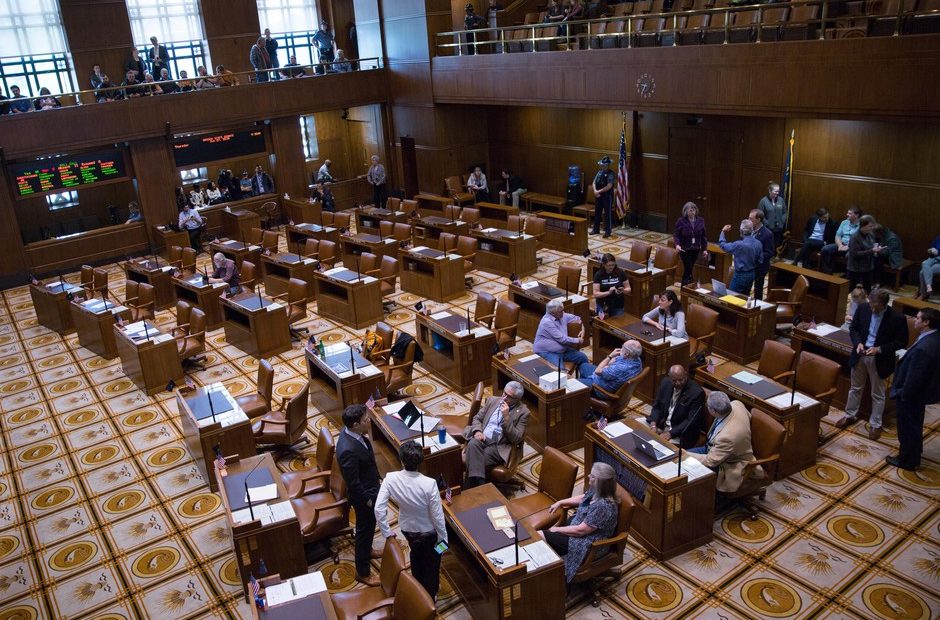
In Oregon, It’s Déjà Vu All Over Again As Republicans Stage Legislative Walkout — Just Like 2019
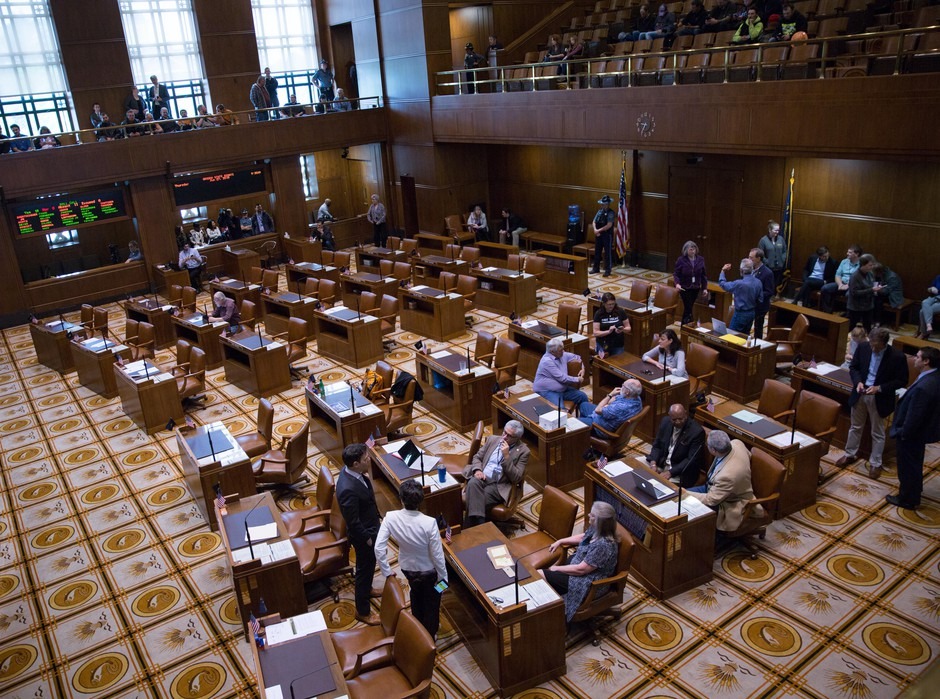
READ ON
Updated Feb. 25, 2020, 10 a.m. PT
Cap and trade is on its way to the Senate floor in Oregon again — and Republicans are heading for the exits.
Republicans in the Oregon House have now walked away from the Capitol over contentious climate change legislation, following the lead of GOP senators the day prior.
In a cryptic statement Tuesday morning, House Republican Leader Christine Drazan said Democrats “have not had an interest in respecting the legislative process and have repeatedly refused to compromise” over Republican amendments to Senate Bill 1530, the session’s primary climate bill.
Though Oregon Democrats have supermajorities in both the House and Senate, Drazan accused them of using a “rigged process” to move the bill. She made no mention that her members would be absent Tuesday, but said: “we will continue to keep all lines of communication open.”
In a tense hearing Monday morning, the Oregon Legislature’s budget committee passed out Senate Bill 1530 largely along party lines.
SB 1530 would cap the greenhouse gas emissions allowed by the transportation, manufacturing and utility sectors, and lower the cap over time. Large emitters would be required to obtain credits for each metric ton of emissions and could trade those credits among themselves.
The vote marked a cutoff point Republicans have long signaled was likely to prompt them to stop showing up to the Capitol. After Monday’s hearing, they immediately showed those threats weren’t idle.
In a Senate floor session Monday morning, Sen. Tim Knopp of Bend was the only Republican present. Without at least one more GOP senator, the Senate cannot reach the 20-member quorum required to do business.
Republicans staged a walkout last June, when a similar bill was on the precipice of a Senate vote, prompting Senate President Peter Courtney to ask that state police be sent after them.
The involvement of police added to tensions, sending Republicans across state lines and prompting controversy when one lawmaker, Sen. Brian Boquist of Dallas, appeared to threaten violence against officers.
On Monday, Courtney immediately ruled out calling on state police again, saying it would be a waste of public safety resources.
“I don’t want state troopers running around trying to hunt down a bunch of elected officials saying, ‘Would you please come to the chamber and do your job?’” Courtney said. “That’s more of a big show thing, and I’m not interested in big shows.”
In the floor session, Courtney implored Republicans to return to the Capitol in order to take up a raft of pressing policy and budget items that have yet to pass the Senate. Those include new spending appropriations for mental health, wildfire prevention, and homelessness, among other things, and policy bills that would enact new gun controls and address forest management.
In an interview, Courtney made clear that Democrats had consciously chosen to force a confrontation on the climate change bill before passing other measures first.
“I told [Senate Minority Leader Herman Baertschiger Jr.] I’ve got to make a move on this thing,” Courtney said. “We’ve got to have a collision to show everybody where everybody is. That’s what happened today.”
He added that SB 1530 has 17 Democratic votes in the Senate, more than enough to send it on to the House.
Gov. Kate Brown, meanwhile, had withering words for Republicans — an approach that did not attract them back into the building last year.
“It’s extremely disappointing that instead of staying to do the jobs they were elected to do Senate Republicans have chosen to take a taxpayer-funded vacation,” Brown said. “The Senate Republicans are not against climate policy, they are against the Democratic process.”
Earlier Monday, the budget committee vote on the bill displayed an array of tensions that have long simmered around the cap-and-trade policy, along with some new concerns.
Republicans tried to alter the bill to remove new public records exemptions and to insert a referral to voters. They also tried to swap out the proposal for a very different climate change proposal that would take into account the carbon sequestered by Oregon’s trees in determining the state’s emissions, resulting in far less regulation.
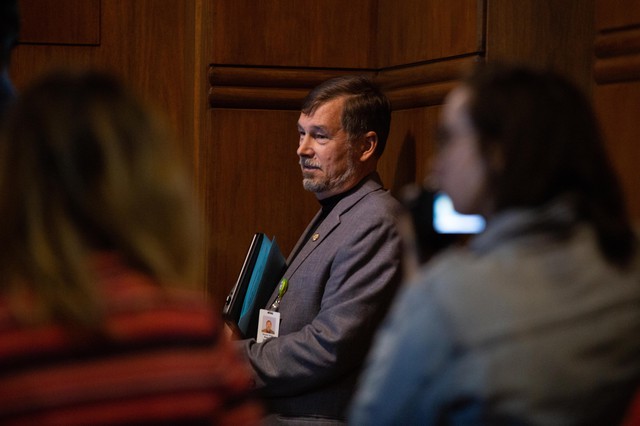
File photo. Oregon Sen. Brian Boquist, R-Dallas, waits to enter the floor of the Senate on the last day of the 2019 legislative session. Sen. Boquist said that no one should have cause to worry about their safety, after his remarks that state police should “send bachelors and come heavily armed” if they tried to apprehend him during the GOP walkout the previous week. CREDIT: KAYLEE DOMZALSKI/OPB
Each proposed amendment failed to pass, even as Sen. Betsy Johnson, D-Scappoose, joined ranks with Republicans. Johnson’s long aversion to a cap-and-trade system meant the bill faced difficulties in the Joint Ways And Means Committee, where bills must secure a majority of both House and Senate members to pass, irrespective of the vote total.
Johnson’s opposition prompted Courtney to sit in on the committee, exercising his powers to cast a vote in addition to other lawmakers and tipping the scales in favor of SB 1530.
Cap-and-trade has been among the most contentious issues lawmakers have considered for the last three years, but Courtney’s presence on the committee spurred the most argument Monday.
Republicans repeatedly questioned whether or not he was allowed to serve as an additional vote on the committee. In cases where a favored bill was unlikely to clear committee, Courtney has more often temporarily replaced a committee member to muscle the Legislation through.
“This is the first time I’ve seen this in my 11 years,” said Sen. Chuck Thomsen, R-Hood River, one of several lawmakers questioning the propriety of Courtney’s vote.
Legislative professional staff maintained the move was perfectly legal. Both Legislative Fiscal Officer Ken Rocco and Secretary of the Senate Lori Brocker told lawmakers that the Senate president has had the powers for decades.
“It’s been a longstanding practice that the president can sit on any committee and vote,” Rocco told lawmakers, some of whom did not appear convinced.
In a press release following the vote, Baertschiger, R-Grants Pass, all but announced a walkout would begin, saying: “Senator Courtney’s actions leave no other option for Senate Republicans but to boycott and deny quorum because cap and trade is on the way to the Senate floor.
“Pay attention Oregon – this is a true example of partisan politics,” Baertschiger added.
Democrats have made passing the cap-and-trade proposal the signature goal of the five-week legislative session, arguing that climate change is the pressing issue of our time. Though Oregon makes up a tiny sliver of global carbon dioxide emissions, they say the state must take action. They also believe that other states will follow Oregon’s lead.
While SB 1530 is far more lenient in someways than last year’s failed attempt at cap and trade, it would still present new costs for some companies, particularly fuel importers. Democrats have repeatedly responded to concerns by altering how fuel companies are regulated, but Republicans maintain that higher prices at the gas pump will have devastating effects on Oregon’s economy.
Republicans have repeatedly demanded that Democrats refer the matter to voters, and renewed those calls Monday.
“I trust the voters, and I think we should trust the voters,” said Fred Girod, R-Stayton. If a referral were added to the bill, he said, “We would definitely stick around.”
Democrats have refused to add a ballot referral, arguing they’re doing their jobs by passing complex legislation. Privately, some worry that the measure could be vulnerable if industrial opponents spend millions to defeat it in November.
Republicans have also repeatedly questioned whether SB 1530 is a revenue-raising bill — a trait that would require it to be introduced in the House, and to secure three-fifths support in both chambers. Legislative attorneys have repeatedly said they do not believe the bill is technically a tax. The matter is expected to be challenged in court if the bill passes.
What happens next was in flux Monday morning. A Republican walkout could upend the legislative session before a number of pressing budget appropriations have passed, along with bills to address homelessness, wildfires and gun control.
Moreover, it’s unclear what Democrats would be willing to sacrifice in order to coax Republicans back in the building.
“It’s an awfully big step for them to kill a session,” said Sen. Michael Dembrow, D-Portland, a key author of SB 1530. “If they go, we’ll continue to do our work. Our committees will continue to prepare.”
Copyright 2020 Oregon Public Broadcasting. To see more, visit opb.org
Related Stories:
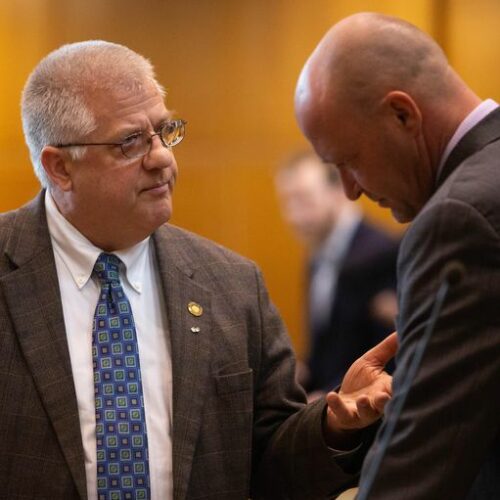
Oregon House Expels Rep. Mike Nearman, Plotter Of State Capitol Incursion
Nearman refused to resign in the face of overwhelming evidence he would be ejected from the Legislature. The four-term Republican lawmaker becomes the first person ever expelled from the Oregon House.
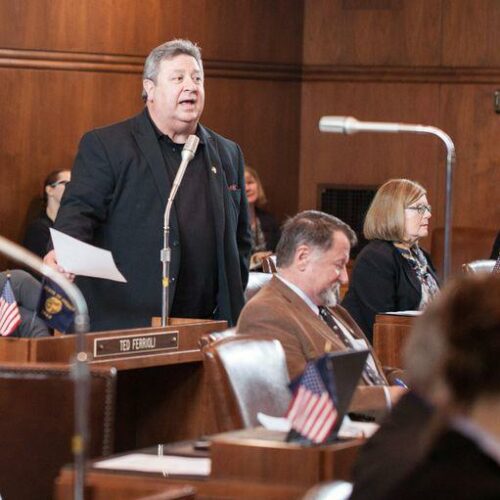
While Oregon’s Legislature Feuds, Washington Lawmakers Find A Way To Work Together
The two states are both led by strong Democratic majorities and face similar issues. Only one of them is successfully passing legislation.
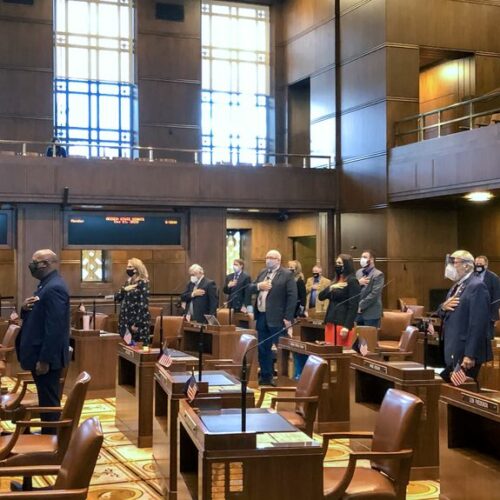
For 3rd Straight Year, Oregon Senate Republicans Stage Walkout To Stop Legislative Business
Criticizing a session they say is moving too quickly, Republicans refused to attend a floor session of the Oregon House on Tuesday evening. Lawmakers showed up to the House chamber at 6 p.m. with Rep. Cheri Helt, R-Bend, the only Republican in attendance.















